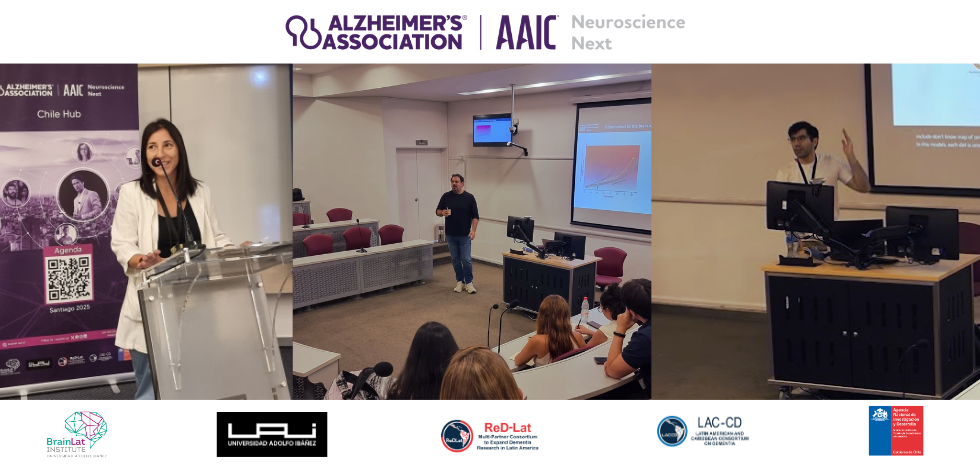El segundo día del congreso se centró en los factores de riesgo asociados a la demencia y su prevención. Claudia Duran-Aniotz, Directora del LAC-CD (Consorcio Latinoamericano y del Caribe sobre Demencia) y de BrainLat, abrió el evento enfatizando la importancia y trayectoria del consorcio, que supervisa y promueve actividades clínicas y de investigación sobre la demencia.
«Junto a mi amigo y colega Hernando Santamaría, estamos liderando el Consorcio Latinoamericano y del Caribe sobre Demencia, creado y establecido con Agustín Ibáñez y Mario Parra en 2015. Este año celebramos nuestro décimo aniversario y ahora contamos con más de 300 investigadores, formuladores de políticas y diversas personas que pueden asociarse a este consorcio para fortalecer capacidades», destacó Duran-Aniotz.
Adolfo García (CNC – ReDLat) y Boon Lead Tee (GBHI) presentaron su investigación sobre la diversidad global de la salud cerebral a través del análisis del habla natural. García es doctor en neurociencia y se especializa en la neurociencia del lenguaje. Se desempeña como Director del Centro de Neurociencia Cognitiva (UdeSA, Argentina), Senior Atlantic Fellow en el Global Brain Health Institute (UCSF, EE.UU.) e Investigador Asociado en la Universidad de Santiago de Chile. Boon Lead Tee es neuróloga especializada en demencia, en particular en la afasia progresiva primaria. Es Profesora Asistente de Neurología en la Universidad de California, San Francisco (UCSF) y miembro del Global Brain Health Institute (GBHI).
También se abordaron temas clave como la depresión y su papel en la relación entre el dolor crónico y la demencia, así como los avances en biomarcadores y ensayos clínicos en Chile. La sesión concluyó con la presentación de innovaciones locales en la intervención y apoyo a cuidadores, además de un espacio para la exhibición de pósters científicos.
Carlos Coronel (BrainLat) y Enzo Tagliazucchi (BrainLat) lideraron el workshop sobre métodos computacionales para la investigación en salud cerebral. Durante la sesión, se presentó y explicó el proceso para estimar la edad cerebral, tanto en investigación como en evaluación clínica, incluyendo estrategias de validación e identificación de los principales desafíos en la modelización. El workshop contó con dos sesiones: la primera, liderada por Tagliazucchi, tuvo como objetivo introducir a los estudiantes y al público general en modelos para la estimación de la edad cerebral basados en neuroimágenes. La segunda sesión, a cargo de Carlos Coronel, se enfocó en modelos biofísicos del cerebro como parte de los mecanismos del envejecimiento acelerado.
The second day of the congress focused on risk factors associated with dementia and its prevention. Claudia Duran-Aniotz, Director of LAC-CD (Latin American and Caribbean Consortium on Dementia) and BrainLat, opened the event by emphasizing the importance and trajectory of the consortium, which oversees and promotes clinical and research activities on dementia.
«Together with my friend and colleague Hernando Santamaría, we are leading the Latin American and Caribbean Dementia Consortium, created and established with Agustín Ibáñez and Mario Parra in 2015. This year marks our 10th anniversary, and we now have more than 300 researchers, policymakers, and various individuals who can be associated with this consortium to build capacity,» highlighted Duran-Aniotz.
Adolfo García (CNC – ReDLat) and Boon Lead Tee (GBHI) presented their research addressing global brain health diversity through natural speech analysis. García holds a Ph.D. and specializes in the neuroscience of language. He serves as Director of the Cognitive Neuroscience Center (UdeSA, Argentina), Senior Atlantic Fellow at the Global Brain Health Institute (UCSF, USA), and Associate Researcher at the University of Santiago, Chile. Boon Lead Tee is a neurologist specializing in dementia, particularly primary progressive aphasia. She is an Assistant Professor of Neurology at the University of California, San Francisco (UCSF), and a member of the Global Brain Health Institute (GBHI).
Key topics such as depression and its role in the relationship between chronic pain and dementia were also discussed, along with advances in biomarkers and clinical trials in Chile. The session concluded with the presentation of local innovations in caregiver intervention and support and a space for the exhibition of scientific posters.
Carlos Coronel (BrainLat) and Enzo Tagliazucchi (BrainLat) led the workshop on computational methods for brain health research. During the session, they presented and explained the process of estimating brain age, both in research and clinical evaluation, including validation strategies and the identification of key challenges in modeling. The workshop consisted of two sessions: the first, led by Tagliazucchi, aimed to introduce students and the general public to models for estimating brain age based on neuroimaging. The second session, led by Carlos Coronel, focused on biophysical models of the brain as part of the mechanisms of accelerated aging.

